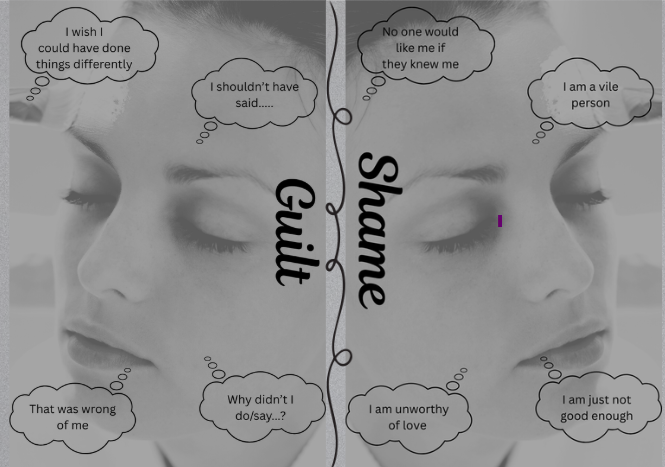Understanding Shame
Shame vs Guilt
Many people think that shame and guilt are one and the same. However, there are vital differences:
Guilt - relates to something we have done (or omitted to do)
Shame - relates to the feeling that there is something wrong with who we are.
This difference can be spotted by listening to the internal voice associated with it and what it is saying.
In shame, this is usually along the lines of, “I’m not good enough,” or “If people really knew me, they wouldn’t accept me.”
In guilt, the voice is more concerned with what we should or should not have done or said.
If left unchallenged, both guilt and shame can affect self-esteem, relationships, and general mental health. The good news is that with the right support, it is possible to understand and move forward from feelings of shame, reclaiming your sense of worth.
What is Shame?
Shame is a natural human emotion, often rooted in early life experiences, family dynamics, or societal pressures. It might arise from criticism, neglect, rejection, or even cultural expectations about how we “should” behave. Unlike guilt, which motivates us to make amends, shame tends to isolate us. It convinces us to hide parts of ourselves, withdraw from others, or build protective walls.
Many people living with shame report feelings of anxiety, depression, or perfectionism. They may find it hard to form close relationships, fearing judgment or rejection. Shame can also fuel harmful coping strategies such as overeating, substance use, or overworking, as a way of numbing the painful feelings underneath.
How shame harms our mental health
Carrying shame for long periods of time can be exhausting. It often leads to self-criticism, a harsh inner dialogue, and difficulty accepting compassion from others. Shame has been linked to:
Low self-worth – feeling undeserving of love, success, or happiness.
Anxiety and depression – ongoing worry, sadness, or emptiness.
Relationship struggles – difficulty trusting others or expressing vulnerability.
Perfectionism – setting impossible standards to cover up feelings of inadequacy.
Shame may also lead us to stay in toxic relationships and situations, feeling we are unworthy of something better.
Recognising the role shame plays in your life is the first step toward change.
Can counselling help?
Counselling can help you to examine and understand where your feelings of shame come from. It can help you to release old burdens and change old patterns of thinking and behaving that may have worked to increase your sense of shame. Counselling is not a quick fix, you are not a problem to be solved or something broken to be mended. You have the answers within yourself; a counsellor walks with you while you examine these and move forward to a new and better way of being. A skilled therapist will help you to:
Identify shame triggers – noticing when shame arises and how it shows up in your body and thoughts.
Challenge negative beliefs – replacing “I’m not enough” with healthier, more compassionate perspectives.
Build self-compassion – learning to treat yourself with the same kindness you would offer a friend.
Reconnect with others – understanding that shame thrives in silence, but heals through safe, supportive relationships.
Moving Forward
If shame has been holding you back from living fully, counselling can offer the support you need. You do not have to face these feelings alone. Please get in touch to see if I can help you to start the journey forward. Together we can begin to quiet the inner critic, rebuild your confidence, and cultivate healthier, more fulfilling relationships.


